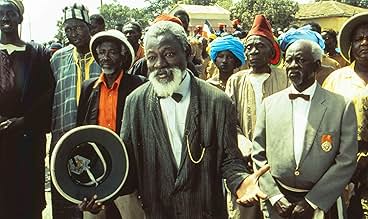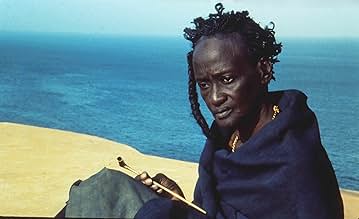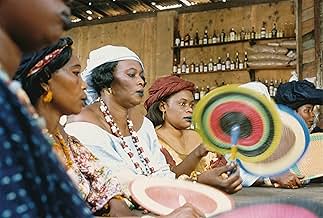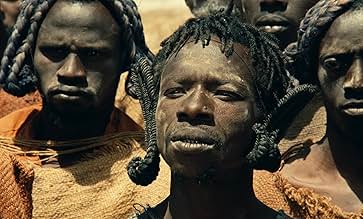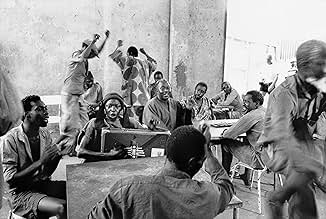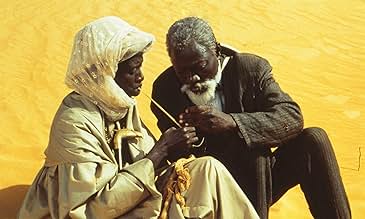CALIFICACIÓN DE IMDb
7.4/10
1.5 k
TU CALIFICACIÓN
Dramaan es el hombre más popular de Colobane, pero las cosas cambian cuando una mujer de su pasado vuelve a la ciudad.Dramaan es el hombre más popular de Colobane, pero las cosas cambian cuando una mujer de su pasado vuelve a la ciudad.Dramaan es el hombre más popular de Colobane, pero las cosas cambian cuando una mujer de su pasado vuelve a la ciudad.
- Dirección
- Guionistas
- Elenco
- Premios
- 1 premio ganado y 1 nominación en total
Omar Ba
- Le chef du protocole
- (as Omar Ba dit 'Baye Peul')
Issa Samb
- Le Professeur
- (as Issa Ramagelissa Samb)
Rama Thiaw
- La femme du Maire
- (as Rama Tiaw)
Abdoulaye Diop
- Le Médecin
- (as Abdoulaye Yama Diop)
Oumi Samb
- La danseuse
- (as Oumy Samb)
Tcheley Hanny
- Amazone
- (as Hanny Tchelley)
- Dirección
- Guionistas
- Todo el elenco y el equipo
- Producción, taquilla y más en IMDbPro
Opiniones destacadas
Djibril Diop Mambéty's Hyenas doesn't quite jump the shark to the extent of Eugène Ionesco's Rhinoceros, a corrosive social satire which dramatizes the macro and micro fallibility of humankind by having people literally transform into the titular safari animal... but so searingly incisive is Mambéty's critique that you get the sense he's at least toyed with the idea. Adapting Swiss-German satirist Friedrich Dürrenmatt's play The Visit, Mambéty ups the stakes of the text's Sophie's choice scenario (is one man's life worth untold millions for a town fallen into ruin?) by setting it in rural Senegal, wherein the collective battle of moralism and pride against a paradigm shift of wealth is amplified to poignant and sobering heights. As such, Hyenas serves to both savagely lambast the corrosive legacy of colonialism in a recently independent Senegal, while equally shedding the spotlight of judgment on the role of virtue in a capitalist society - an experience which generally proves equally squirmy for the average viewer, as for the characters onscreen. Hyenas is billed as a dark comedy, but, apart from trace elements of allegorical magic realism (we never find out exactly how an exiled, former teenage prostitute has become "richer than the world's bank"), there's only the bleakest, most mirthless of incredulous guffaws to be found therein. Instead, Mambéty wrings out every last drop of uncomfortable empathy in depicting a poor but proud people steadily succumbing to materialistic, murderous mob mentality* - a scenario that starts absurd, but quickly becomes far too familiar. Mambéty's witty screenplay deftly unspools each wrinkle of collective corruption, from the nattily dressed mayor bemoaning the degraded state of his town, oblivious to the rag-wearing homeless man bemusedly building a fire immediately behind him, to the townspeople vocally expressing their outrage ("She thinks we're Americans who would kill each other for nothing!") while blatantly strutting around wearing their bribes, practically collectively willing the murder into a fatalistic eventuality. As the situation escalates, Mambéty lets the poignancy of the joke fester. Things may start with comparative levity, (Mambéty turns each townsperson lobbying for new refrigerators and air conditioners into a sordid, Oprah-esque gameshow), but it isn't long before the initial paradoxical joviality decays into a literal torch-bearing mob (the town gaslighting their 'walking dead' peer by barring him entrance to a train leaving town while wishing him a good trip is genuinely hard to watch), before culminating in a dirge of chanting, shuffling zombies. Though Hyenas is, for the most part, a slow, sombre, methodical film, Mambéty lends it a larger-than-life aesthetic grandeur. His cinematography employs a high saturation rate, with the vibrancy of colours (glaring, aggressive reds, and the encroaching, corrupting sheen of gold) popping against the beige of (gorgeously shot) sweeping expanses of desert perfectly encapsulating the intoxicating allure of colonial socioeconomic transformation. Similarly, Wasis Diop's moody guitar score lends a thoughtful, eulogistic dignity to the slow, fatalistic social decay at play. While some of Mambéty's visual metaphors are a touch hit-and-miss (while having the townspeople slowly adapt hairstyles recalling hangman's nooses is a slick piece of visual trickery, his Modern Times-esq consistent cross-cutting between brewing mobs and a pack of snarling hyenas is a bit too on-the-nose), the consistent framing device of herds of local animals stirring uneasily (including a poor captive monkey at the film's central hub, who ends up becoming a disapproving Greek chorus unto itself) does lend the film an effectively disquieting restlessness. And as for the perplexing, sneaky ambiguity of the film's final shot? Mambéty is content to let the viewer stew, and draw their own conclusions. As the formerly "most popular man in Colobane" turned 'most likely to be assassinated,' Mansour Diouf anchors the film with an immaculately balanced performance that shifts from irreverent goofiness, to exasperated histrionics, before finishing with a quieter, sadder dignity. He carefully toes the line of remaining sympathetic without ever becoming too likeable throughout, instead wearing his flawed humanity on his sleeve with a gentle, sad, side-smile. As the imposingly wealthy homecoming Linguère Ramatou, Ami Diakhate steals the show with a formidable, commanding presence. In less capable hands, Ramatou, with her devious master plan and golden artificial limbs, would play like a Bond villain - but Diakhate ensures that Ramatou's vitriol is grounded in a lifetime of real, radiating hurt, which Diakhate rawly embodies with consummate class. Faly Gueye consistently steals scenes with an icy deadpan humour as Diouf's perennially unimpressed wife, while Mahourédia Gueye pompously postures like the best of them as the town's blustery mayor.
Fuelled with the timeless wisdom of a Classical Greek tragedy, yet coursing with the contemporary, acrid urgency of an itching postcolonial critique, Mambéty's Hyenas is a stirring, vibrant, and grimly entrancing watch. Although one can't help but with that Mambéty had dialled back the somewhat overblown visual symbolism a tad, and instead redirected that energy into a shade more of the tension-breaking humour just aching to surface, his film remains an unflinchingly striking watch. A cornerstone of contemporary African cinema, Hyenas is a timeless snarl at the overbearing fatalism of colonialism and capitalism - and, over 25 years on, it hasn't lost a whit of potency or relevance.
-8.5/10
*How's THAT for alliteration?
Fuelled with the timeless wisdom of a Classical Greek tragedy, yet coursing with the contemporary, acrid urgency of an itching postcolonial critique, Mambéty's Hyenas is a stirring, vibrant, and grimly entrancing watch. Although one can't help but with that Mambéty had dialled back the somewhat overblown visual symbolism a tad, and instead redirected that energy into a shade more of the tension-breaking humour just aching to surface, his film remains an unflinchingly striking watch. A cornerstone of contemporary African cinema, Hyenas is a timeless snarl at the overbearing fatalism of colonialism and capitalism - and, over 25 years on, it hasn't lost a whit of potency or relevance.
-8.5/10
*How's THAT for alliteration?
Watched this 30 years after its creation and am very glad I did.
A short review : the way it seems I am should feel about Fellini, I feel about this film. I enjoy some Fellini films, but for whatever reason I felt more connected to this tale.
This film has plenty of spectacle. I mention fireworks, but a carnival in fact sprouts forth from the land (and the pursue of the dishonored woman returning to her home town).
There are both metaphoric and literal hyenas circling the town. The casting of Ami Diakhate was great and this the only film she ever made as far as I can tell. Feels like that might be a story in itself.
Just read an interview with the director (who died 7 years after this film from lung cancer, perhaps a colonial-induced cancer?) Anyways I think he was just a vibrant artist and able to guide dreams both as the director of the film and as a character within it. A master puppeteer never lets you see the strings.
That scene towards the end where Diakhate's character meets with her former lover/enemy/despoiler/mayor/public enemy is rather remarkable. From gazing out at the ocean together sharing an intimate smoke, to Diakhate descending into what looks like a tomb watching from afar as the mayor meets symbolic hyenas on the outskirts of town.
Such a smooth dream-like portrayal of a jarring event.
Next up for me "Touki Bouki"
A short review : the way it seems I am should feel about Fellini, I feel about this film. I enjoy some Fellini films, but for whatever reason I felt more connected to this tale.
This film has plenty of spectacle. I mention fireworks, but a carnival in fact sprouts forth from the land (and the pursue of the dishonored woman returning to her home town).
There are both metaphoric and literal hyenas circling the town. The casting of Ami Diakhate was great and this the only film she ever made as far as I can tell. Feels like that might be a story in itself.
Just read an interview with the director (who died 7 years after this film from lung cancer, perhaps a colonial-induced cancer?) Anyways I think he was just a vibrant artist and able to guide dreams both as the director of the film and as a character within it. A master puppeteer never lets you see the strings.
That scene towards the end where Diakhate's character meets with her former lover/enemy/despoiler/mayor/public enemy is rather remarkable. From gazing out at the ocean together sharing an intimate smoke, to Diakhate descending into what looks like a tomb watching from afar as the mayor meets symbolic hyenas on the outskirts of town.
Such a smooth dream-like portrayal of a jarring event.
Next up for me "Touki Bouki"
Dürrenmatt's play The Visit is one of the best stories ever told about guilt and honesty. Would it be ruined by being transferred to a village in Africa by a visionary director whose main quality is to create images? That's what I asked myself before watching Hyenas.
And I was surprised in the most positive way. Diop Mambéty hardly changed the plot but supplied it with wonderful images which can only be found in Africa. So why didn't he change the story? Because he didn't have to. The story of the old lady taking revenge on her home village in the most cruel way fits perfectly into the context Mambéty placed it. It seems as though the story had never been imagined to take place in Switzerland; Senegal absorbs it completely.
The choice of Ami Diakhate is maybe the most perfect ever made by any film or stage director, as regards the role of Dürrenmatt's old lady. She has the mark of death and bitterness on her, the condescension of the rich and the hatred of those who have been humiliated. The other actors are charming, also well-cast, though sometimes I felt they would have needed a little more directoral guidance. However, my untrained European eye was not expected too much of: in some Asian, Afroamerican or African movies (shame on me) it is very hard for me to tell the various characters apart, which was not the case in Hyenas.
A wonderful story, a wonderful film. A pity that I will probably never see it again.
And I was surprised in the most positive way. Diop Mambéty hardly changed the plot but supplied it with wonderful images which can only be found in Africa. So why didn't he change the story? Because he didn't have to. The story of the old lady taking revenge on her home village in the most cruel way fits perfectly into the context Mambéty placed it. It seems as though the story had never been imagined to take place in Switzerland; Senegal absorbs it completely.
The choice of Ami Diakhate is maybe the most perfect ever made by any film or stage director, as regards the role of Dürrenmatt's old lady. She has the mark of death and bitterness on her, the condescension of the rich and the hatred of those who have been humiliated. The other actors are charming, also well-cast, though sometimes I felt they would have needed a little more directoral guidance. However, my untrained European eye was not expected too much of: in some Asian, Afroamerican or African movies (shame on me) it is very hard for me to tell the various characters apart, which was not the case in Hyenas.
A wonderful story, a wonderful film. A pity that I will probably never see it again.
A stunning adaptation of Friedrich Durrenmatt's coldly brilliant play, The Visit, HYENES (hyenas) actually improves on the story by transposing the action to a Senegalese village. A fabulously wealthy old woman, who was born in the village but run out in disgrace as pregnant youth, returns and promises the villagers a fortune on one condition: that they kill the man who ruined her, an aged man who is the town's popular, good-natured grocer.
By moving the story from Durrenmatt's European setting to a dirt-poor African village, all the tensions are heightened, and the director Mambety sets the huge issues in high relief against the desert backdrop: justice, betrayal, revenge, guilt, greed (or need?), loyalty, and charity are played out in a searing (and searingly beautiful) desert, filmed with the grace of Bergman and written with the wryness of Bunuel. There are no good guys. It's up to you if there are bad guys. Everyone is a predator.
By moving the story from Durrenmatt's European setting to a dirt-poor African village, all the tensions are heightened, and the director Mambety sets the huge issues in high relief against the desert backdrop: justice, betrayal, revenge, guilt, greed (or need?), loyalty, and charity are played out in a searing (and searingly beautiful) desert, filmed with the grace of Bergman and written with the wryness of Bunuel. There are no good guys. It's up to you if there are bad guys. Everyone is a predator.
After the twenty-year period of silence following the success of 'Touki Bouki', Mambéty's second film gives its satire a more analytical frame. The quasi-allegorical narrative structure explores the relation of past to present within a specifically-though exaggerated-political frame; its events are specifically set in a collective context, where the continuing legacy of imperialism as it effects relations gendered, sexual and economic relations in the (post)colony. Returning to her village as a fabulously wealthy citizen, for whom wealth is also index of damage, literal prosthesis-the arm made of gold!- Linguère Ramatou is something like 'Touki Bouki's' Anta some decades on, returned to take revenge on Dramaan Drameh, the man who abandoned her and has since taken up a role as a comfortable, well-liked bar owner-and a kind of de facto, unofficial mayor-within the still impoverished town. The devil's bargain-that her wealth will be that of the village if they execute him-is not only index of personal revenge, a kind of just deserts for the past sins of patriarch-Drameh paid false witnesses to testify that he was not the father of her child, leading her to be driven out of town and to a career as a sex worker-but of the inhuman and dehumanising bargains of global capital, the mendacious ways in which continuing underdevelopment and the power relations of the centre-periphery relation structure the life it's possible to live. Ramatou simply serves as the agent of the ways in which collectives are divided-whether by the structures of gendered power relations or by the 'hyena-like' rapaciousness the promise of money brings. Such economic structures rely on the mythic realities that any dream can be bought, and that its fulfilment will invariably come at the expense of others. Through a satirical broad-brush, Mambéty seeks to make such bargains specific, rather than the abstract underlay of virtually every human interaction; it makes a vivid and convincing case whose laughs have the sting of accuracy.
¿Sabías que…?
- TriviaRestored over the course of 2017 by Eclair Digital in Vanves, France. The restoration was taken on by Thelma Film AG.
- ConexionesFeatured in La historia del cine: Una odisea: Movies to Change the World (2011)
Selecciones populares
Inicia sesión para calificar y agrega a la lista de videos para obtener recomendaciones personalizadas
- How long is Hyenas?Con tecnología de Alexa
Detalles
Taquilla
- Total en EE. UU. y Canadá
- USD 24,672
- Total a nivel mundial
- USD 24,672
Contribuir a esta página
Sugiere una edición o agrega el contenido que falta


